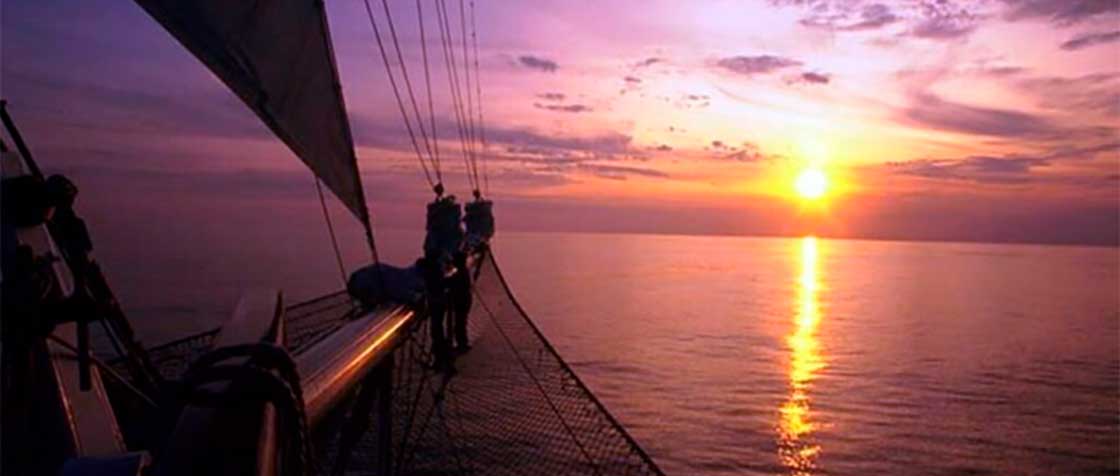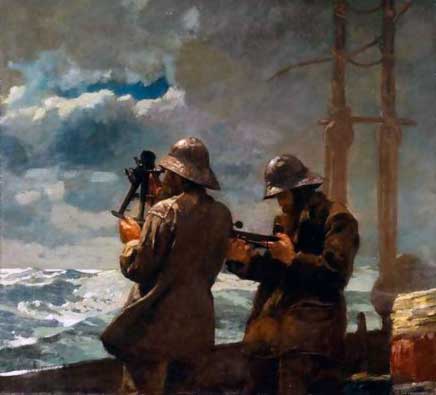
By Rafael Padilla.
The navigation of the soul in life requires spiritual instruments just as the sextant helps the navigator who does not see the coast.

I would like to propose a small exercise to the reader: Imagine that, in a calm sea on a sunny morning, we are on the deck of a sailing ship, fully equipped, not too large, which we are not making move. A very slight breeze blows and our sailboat does not seem to move over the waters.
The coast can’t be seen
But there’s one more detail: we’re on the high seas. That is, the coast is not visible. No matter where we look, we only see a clear horizon, in any direction, without any reference. Besides, we don’t know where we are, which doesn’t contribute to improving things. «If only we were close enough to the coast,» we thought, «we could lead the bow of the ship to it and sail there safely (1) to be able to ask someone…». But that’s not the case: We are in the middle of the sea, without knowing anything, without doing anything, without being able to see anything…
The art of sailing
Before going any further, we can consider the art of navigation as an analogy of the state of our own existence. All of us, without exception, at some point in our lives, feel as if we were on the deck of a small ship, surrounded by the horizon only, wondering what we are doing there, where we are and how to get somewhere. In moments like this, as the involuntary navigator of our history, we feel desolate and lost and it is very likely that we do not know what to do. After all, the one who wants to sail has to learn things, things that we don’t know, if he wants to be given the necessary permits; but to us, it seems that we have already been given the ship and we have been left alone, alone in the middle of the sea.

With this state of affairs, some give up; others take strange and unknown courses that can take them to even stranger places. Others may venture out little by little and end up sailing in circles without knowing what they are doing, lacking points of reference by which to guide themselves. Finally, there is the option that may seem the strangest to us: learning to navigate, perhaps in a rudimentary way at first, but gaining security as we practice navigation. Of course we’ll have to learn a lot of things before we think about moving – it’s one thing to navigate a ship and another to steer it properly – but we have all the time we need.
Navigating by faith
After all, when we were born, we didn’t talk, we didn’t think, we didn’t walk, we didn’t control our bodies, we didn’t know how to read or write, we didn’t know anything about the world, life or the universe; we weren’t even able to ask ourselves these same questions. But if we looked now, trained, educated, trained and capable of doing many things that at first we could not. Maybe… Maybe we have to exercise faith. Faith? In what? Even the most unbeliever and the least believer knows that when you have nothing or know nothing about something that is vital to us, you have to take risks, take them and have the faith necessary to believe that we will be able to move forward. That faith, at least. In this matter, have faith that we can learn something that will allow us to get out of this quagmire in which we are. An all too common behaviour of quite a few human beings is to complain – to protest, let’s go – when difficulties worsen, before even looking around to see what is available. All right, then: What is it that we have around us?
The equipment

In the second paragraph of this writing we have said something fundamental, which may have been overlooked by the reader: That our boat was fully equipped. It brings the sets of lines, of sails, of useful to handle the sails; the lights necessary to sail with fog or at night; a equipment of radio (2), radar and sonar, Books with strange names like «H-229» and a Nautical Almanac, full of tables of numbers. Oh, and a precision watch with a strange time, like 03:53 in the morning (3). But we didn’t find a GPS. We have enough food and water, a cabin with shelter, a table and a bed. And finally in the cockpit, we find Nautical Charts (4) and drawing elements, and next to the logbook (5) in a shelf, of a plastic box of medium dimensions in which it puts in its greater face «Mark-25/26». The box is sealed with a rubber gasket to make it watertight. When we open it, we find inside… a sextant, with the instructions to use it.
The sextant

A Sextant! And what’s that? Basically, an instrument to measure vertical and horizontal angles. Nothing more and nothing less. But in the box, there is a booklet entitled «Instructions for the use of the sextant». What are we going to measure in this aqueous desert in which there is nothing? As we read the instruction book, little by little we understand that we had overlooked everything. That the place we are in had many things, many, to help us know where we are and to be able to go safely to a safe port. The first, the Sun that illuminates us and which we always take for granted. And the Moon. And the stars… No, reader, I do not pretend that, as I have already said, this is an introductory talk to maritime navigation, which it is not, but what I intend is to draw an analogy between maritime navigation and our own lives.
Who am I?
And it is true; at some point in our existence we end up asking ourselves: Who am I? Where do I come from? What am I doing here? And the one that most strikes us, which we seem to suppose from the experiences of others: Where am I going, towards death? In the same way that the one who has not sailed can avoid even the Sun that illuminates him, the one who is lost in existence can avoid details, signals, instruments that he can use to find answers to his questions And the analogy of the Sun is ancient. So much so, that the Greeks, as Aristotle and Plato compared the Sun as the protoarje, the symbol of the beginning of all things: NOY∑ or NOUS. Within each human being there is an inner guiding principle that the navigators of all times would have wanted to have. Yes, it helps us to go from one place to another knowing where we are; but its effects act on our morality. Some people call this principle «Consciousness». And it can represent much more than a beginning. There is a little poetry exposed in a Naval School and in many other places, which it says: [su_note note_color=»#caecef» text_color=»#401919″ radius=»8″]“He who does not know how to pray, let him go through those seas and he will see that soon he learns without anyone showing him.”[/su_note]
Navigation of the soul
In the seas of life, squalls are no longer considered such, unless they attack our own desires, and even our own selfishness. However, there are storms, and galleys, that sometimes come to us and sometimes we ourselves go searching. Sometimes, even, we ourselves are the squall for others.

And we sail, driven by pain, by resentment, by our worst instincts. And we navigate between the high waves and through the dark or foggy nights. And we sail blind because we ignore the Sun and the stars; because we don’t even have a point of reference on which to lean in order to chart a course. Sometimes, a too strong sea strike damages our ship and leaves us stranded in the water at the mercy of the elements. If only we took advantage of those moments of incapacitation to open the sextant box and at least read the instructions! If only we were able to see that we are immersed in an enormous ocean and that by ourselves we would hardly find a direction… What happiness demands of us is that we at least read the instructions; that we ask for the necessary help if we are unable to do so, and in short, that we be able to stop to listen and look, rather than see. Let’s see, what? The Sun. The Moon… …and the Stars…
1 Which is debatable: From where we are, we don’t know how the coast is either, if there are reefs, sandbanks, cliffs, and so on.
2 Which, by the way, is not going to be very useful to us if we contact another ship and this one, the first thing it tells us is «Understood and received your request for help. We sail towards your ship at full speed. Please tell us where you are» and the only thing we are able to answer is: «. In the water?»
3 Which is nothing but UTC time, commonly known as «Greenwich Mean Time».
4 Which, by the way, won’t be much use if we don’t know which card to use and how to use it; moreover, for the most part and especially in the high seas, the cards only show empty space (the sea) with indications of depths or some scarce segment of coastline that we don’t know. Of course, they have coordinate data throughout the edge of the chart, but again: if we do not know what to do with it …
5 Broadly speaking, the extra-large compass of the ship, which is next to the wheel of the rudder.

Dejar una contestacion